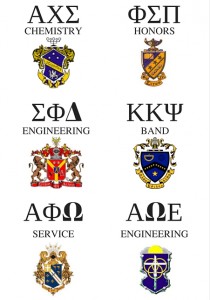At Lehigh, social fraternities seem to have a notable hierarchy over most other clubs and organizations on campus. This can make the members of other groups, like honorary, professional and service fraternities, feel they are not getting their due recognition.
Rob Dorrycott, ’16, the president of the coed honorary band fraternity Kappa Kappa Psi, said he doesn’t always feel his organization is adequately recognized as a fraternity by the campus community.
“If you go around on campus and ask someone, ‘Can you name a bunch of fraternities that are on the Hill?’ most people can say quite a few,” Dorrycott said. “If you go and you say, ‘What’s Kappa Kappa Psi?’ a large majority of people do not know what that is.”
Many professional and honorary fraternities have expressed their desire to gain more recognition on campus, which would allow them to have a wider reach. It can be difficult for these organizations to attract a broad audience, as most of them are interest groups that are specific in the people they recruit.
“(An honorary fraternal organization) is a community,” said Christelle Salloum, ’18, the public relations manager of Phi Sigma Pi, a national honors fraternity. “You actually do join a brotherhood. You do go through a rushing process, it’s just less intense than the one in (social) Greek life…. (The members) all want the same things — to be part of a community, a brotherhood of people who are there for you, who share your interests.”
Honorary, professional and service fraternities at Lehigh are recognized by Student Senate, while social fraternities are represented by the Interfraternity Greek Council, the Panhellenic Council or the Multicultural Greek Council.
Six fraternities and sororities from Lehigh – Phi Sigma Pi, Alpha Phi Omega, Alpha Chi Sigma, Kappa Kappa Psi, Sigma Phi Delta and Alpha Omega Epsilon – are recognized nationally by the Professional Fraternity Association, a national organization that was formed in 1978. They are each either service, honor or professional in nature, thus distinguishing them from social Greek organizations on campus.
Last spring, members of some of Lehigh’s honorary and professional fraternities and sororities who felt that there was a lack of representation on their behalf approached Matthew Kitchie, the senior assistant dean of students and director of Student Activities, and Tim Wilkinson, the former director of Fraternity and Sorority Affairs, about starting a Professional Fraternity Association council at Lehigh.
“It is something that the Office of Student Activities has considered in the past,” Kitchie said. “However, we often find that when organizations and students are really expressing an interest in that, the buy-in is there as well.”
In late April, Kitchie invited the six organizations recognized by the Professional Fraternity Association to meet to discuss the concept of this group. He said that the Office of Student Activities was receptive to the ideas and wanted to work with these groups to form a Professional Fraternity Council at Lehigh.
This semester, delegates from each of the fraternal organizations meet approximately every two weeks to discuss their ideas about the purpose of the council and work to get these ideas off the ground.
“We’re talking more about identity, resources that they need and how can we work together to make the council work,” Kitchie said.
Kitchie said the group provides a space for students to share problems they might encounter, such as membership motivation and marketing. Here, the delegates can talk about best practices for resolving such issues.
“Right now they’re planning on a 5×10 event, mainly for name recognition, to get the word about honors and professional organizations out there,” said Conrad Mason, ’17, the president of the engineering fraternity Sigma Phi Delta. “It’s probably similar to ‘Meet the Greeks’ or some kind of event like the IFC does.”
Mason said the 5×10 event, which fulfills part of first-year students’ orientation requirements, is going to be held in October.
Royce Kok, ’16, committee chair of Alpha Omega Epsilon, a sorority for women in STEM fields, said the 5×10 can help first-year students make more informed decisions about joining professional, honor or social sororities or fraternities.
Mason said his fraternity played an important role in spearheading the creation of the Professional Fraternity Association council at Lehigh. SPD has a dual-affiliation, as it is recognized nationally by both the Professional Fraternity Association and the North American Interfraternity Council. At Lehigh, however, it is only recognized by Student Senate as a professional fraternity.
Mason said SPD petitioned to the Interfraternity Council to become recognized as a social fraternity in addition to their professional status and was denied on multiple occasions. He said that he feels the formation of the Professional Fraternity Council may help them to gain their desired recognition.
“We’re thinking maybe the (Professional Fraternity Association) could – if it gets enough power or respect, if we could get enough actual formality to it – maybe going through that would work just as well,” Mason said.
According to Kitchie, Lehigh’s process of accrediting social fraternities and allowing them to colonize on campus is extremely competitive. Once a year, the Interfraternity Council has a system-wide meeting to determine whether it wants to accept applications for expansion. Mason said priority is given to chapters that have already been recognized at Lehigh, which makes it more difficult for SPD.
He said greater transparency in the accreditation process – explaining what the Interfraternity Council looks for in the fraternities and sororities they accept – might help to level the playing field. Mason said being recognized as a social fraternity would help to increase SPD’s name recognition and allow its members to participate in events that other social fraternities take part in. This would make it easier to recruit new members and also aid with organizing its funding.
Though supportive of the Professional Fraternity Council, Kitchie expressed doubt that SPD’s involvement would have an influence on the fraternity’s recognition by the Interfraternity Council.
“If Sigma Phi Delta were part of the Professional Fraternity Council, I don’t necessarily know if that would have any bearing, negatively or positively, on their candidacy,” Kitchie said.
However, Kitchie said there are many advantages to being a part of the Professional Fraternity Council.
“It brings organizations that have a similar focus or commonality together,” he said. “They can share ideas, talk about what resources would be beneficial to them, recognizing that every student group on campus has individual needs to be operational, but these groups have similar interests, commonalities.”
Kok said if nothing else, the formation of the Professional Fraternity Council has increased communication between the leaders and executive members of Lehigh’s professional and honorary fraternities.
“I’m not exactly sure as to what the future entails,” Kok said. “But having a (Professional Fraternity Association) governing body is definitely a start.”






Comment policy
Comments posted to The Brown and White website are reviewed by a moderator before being approved. Incendiary speech or harassing language, including comments targeted at individuals, may be deemed unacceptable and not published. Spam and other soliciting will also be declined.
The Brown and White also reserves the right to not publish entirely anonymous comments.